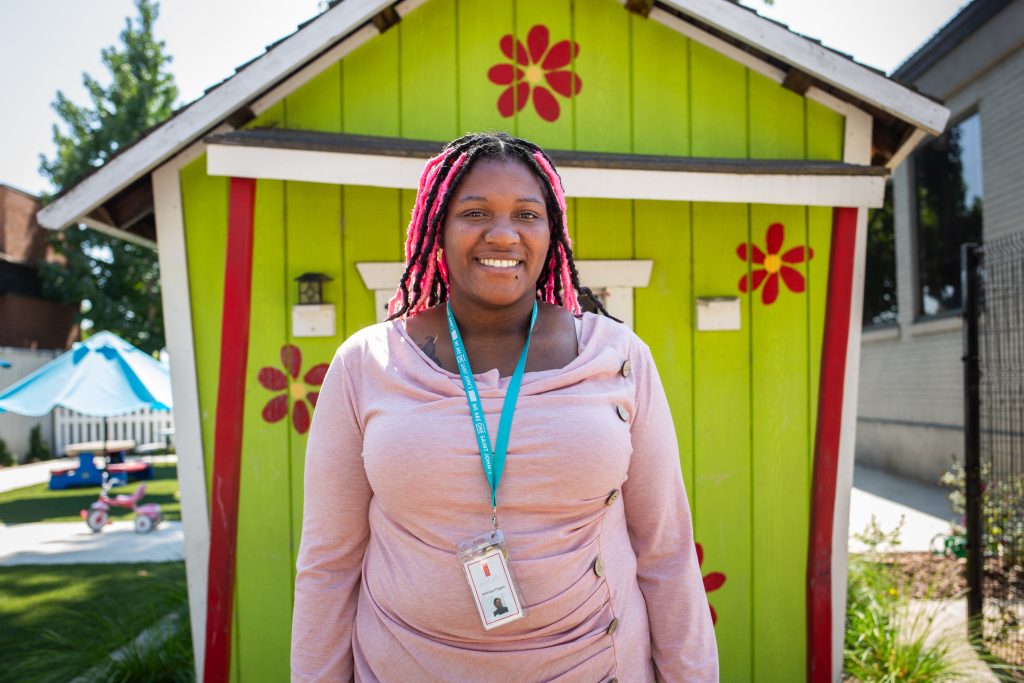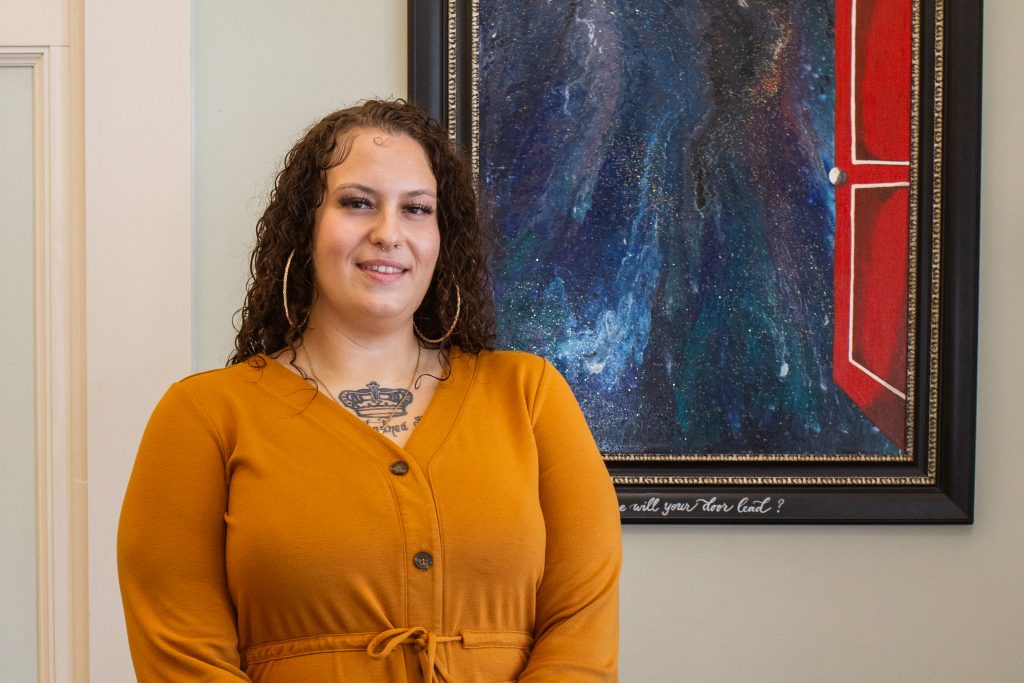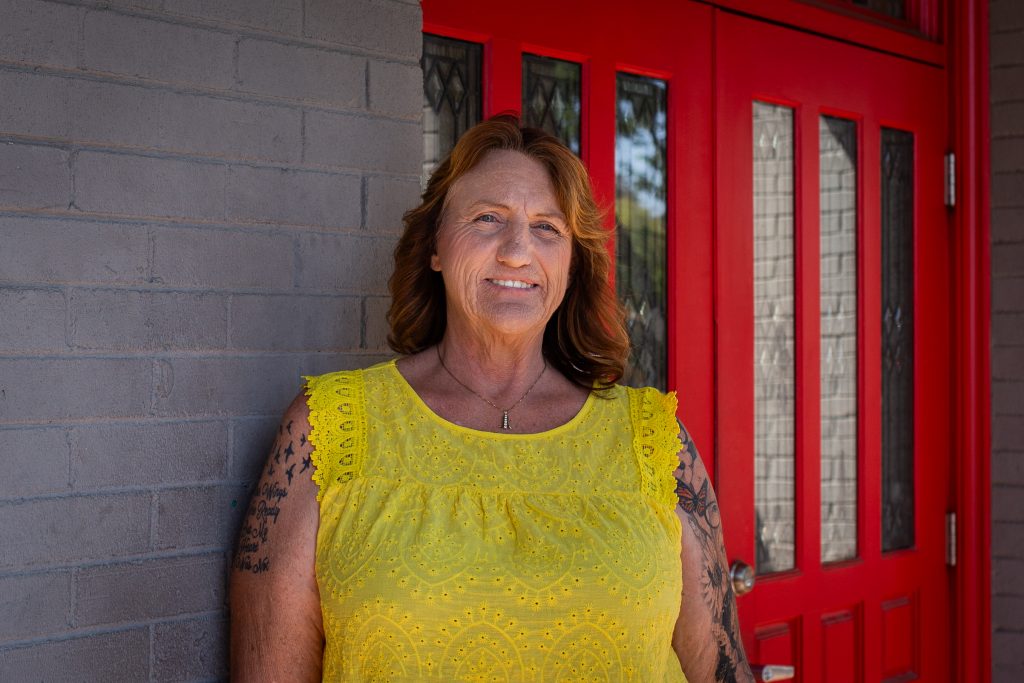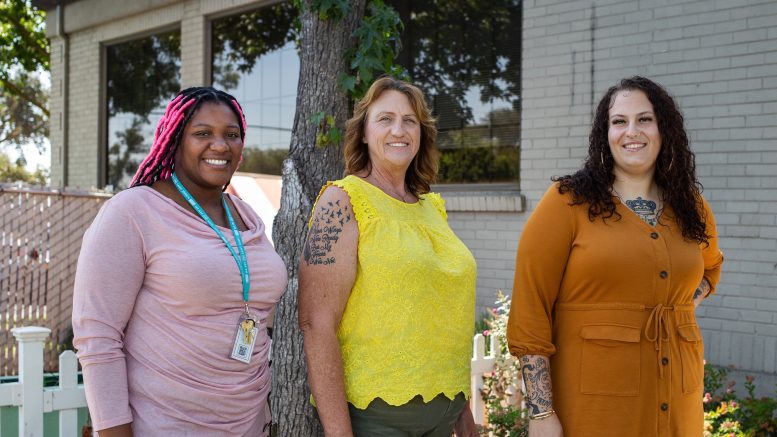By Kate Gonzales
Anyone who’s pursued a path to change knows that at least three things are needed to make it happen: the right environment and resources, and the will.
Sacramento nonprofit Saint John’s Program for Real Change, which has operated a shelter for women and children facing homelessness for nearly 40 years, is home to a voluntary reentry program for women incarcerated in California prisons who are eligible to carry out the remainder of their sentences in alternative custody — between 45 days and 32 months before being released on parole or probation.
A rotation of about 50 women who live in a private location known as “the house,” take slow but important steps toward change, like learning to manage their emotions and earning cell phone privileges, so they can make bigger strides, like enrolling in college or starting their careers. Each with different goals and backgrounds, the women are surrounded by the support of therapists and other professionals as they approach life after a prison sentence.
“These women are doing amazing work,” said Nicole Brock, program director for the local Female Community Reentry Program, or FCRP. Key to that, she said, is self-forgiveness for past mistakes. “When we come through the door, we leave it behind. … We’re teaching them, forgive yourself.”
Participants of FCRP move through the four-phase program that delivers many of the same wraparound services as Saint John’s, albeit at a different location: therapy and substance use disorder counseling, money management courses, vocational training and case management. As they progress into the work world, and some into college, the women build community and a sense of self-reliance. This combination of focused skill-building and vital moral support is designed to help them transition more smoothly back into society with the goal of long-term success.
Part of the state’s 20-year effort to reduce its prison populations, the female reentry program is run in six locations and overseen by the California Department of Corrections and Rehabilitation. Last year, 110 women were served through Sacramento’s reentry program, a 50-bed facility, according to Saint John’s 2023 Impact Report.
“This program, it teaches you so much,” said Marina Brown, a current participant and unofficial “big sister” of the house. “But it’s only if you want to change.”
Meeting women at phase one

It’s not unusual for women’s attitudes to shift as they progress through the program, and Brown admits hers wasn’t great when she arrived at the house last summer. Brock, the program director, remembered thinking: “I don’t know if we’re going to crack this one.”
In the program’s first phase, women begin one-on-one therapy and communication classes, to address the trauma that often accompanies a history of incarceration. Facing those painful memories isn’t easy.
“You start scratching the surface, you’ve got trauma from being abused,” trafficked, or surviving other traumas, explained Brock, who was a client at Saint John’s shelter in 2010. Three staff therapists help the women open up over time, with a patient approach.
“They meet them where they’re at,” Brock said, “and they don’t push.”
Brown half-joked that therapy and group classes helped her in “controlling my ghetto” — which was key to altering her self-image from the product of her upbringing to “a reason out of my environment.”
“A lot of us girls have resentment,” said Brown, explaining that she grew up with parents with alcoholism and inadequate emotional support. “A lot of us girls carry this anger inside and this sadness that eventually turns to anger when you don’t know how to communicate it.”
During a recent movie night at the house, these communication issues were on display when an argument broke out over snacks. Rather than join in any complaining, Brown reminded the group that they could still have a good time watching the movie together. She also welcomes newcomers to the reentry program, getting them “out of their oranges” and set up with six or seven outfits.
“They always say the newest person is the most important,” in addiction treatment programs like Alcoholics Anonymous, she said. “And I believe in that 100%.”
During the first two phases of the program, Brock said staff accompany the women to appointments and any other outings, keeping them close. They can phase up in 60-day increments, but must meet milestones and goals to move up to the next phase.
The women are also given access to cell phones during the second phase, so they can video chat with family and begin setting up their own appointments.
Brock now describes Brown as “the cream of the crop” and pointed out that she’s a “phase four” — the highest phase you can reach in the program. That means she’s trusted with privileges like solo outings to get her nails done, or to see a movie. In July, she went to a movie theater for the first time in years to see the latest “Bad Boys” movie.
As Brown approaches her parole date next January, her confidence is no longer posturing, but rooted in who she’s become: a leader.
“I know that I’m going to go home with tools I’m gonna use for the rest of my life,” she said.
‘Working through a program’

As a former FCRP participant who’s now employed with Saint John’s, Piggee has been on both sides of the program: pushing herself to get through, and encouraging others to keep at it.
After completing her FCRP in 2023, Piggee joined Saint John’s shelter as an interventions services staff member — the go-to person for clients at any time of day. She was later also a case manager, and was a direct source of support in both roles for Saint John’s clients who shared similar struggles to what she’d faced in FCRP: occasional frustration with the pace of the program and tough personal work.
All women served through the traditional shelter at Saint John’s are unemployed and live below the poverty line. Piggee said grappling with her impulsivity issues during her FCRP sentence while being so close to freedom posed its challenges, but she stayed focused on her goals in the reentry program.
“When you’re in a situation where you have to be a part of either one of these programs, you’re not coming from a fun place,” Piggee said. “It actually takes a lot of willingness and conscious decision-making to get through it.”
Each participant gets vocational training that includes help writing resumes and cover letters, and valuable practice through mock interviews. During phase three, when women must pursue either work or education, Piggee did both — taking university classes while working part-time. She credits FCRP services like therapy and the substance use disorder classes for supporting the inner-work that gave her patience and appreciation for her progress.
“It just made me be more mindful that everything doesn’t have to be in crisis mode; everything doesn’t have to move fast,” she said. “Good things happen over time.”
Today, she works as a child care supervisor at Saint John’s and recently graduated from Sacramento State with her bachelor’s degree in family studies and human development.
Beyond the program

Brock said she encourages the women to find work they take an interest in because once they’re hired, they commit to the job for at least six months.
In Brown’s case, her job is especially meaningful to her: packing commissary for incarcerated women for the company Aramark. With the long-term goal of owning a cosmetology business, the job she has today is helping her make strides. Thanks in part to the program’s practice of setting aside money from each paycheck, she has paid off the restitution she owes and will leave with some savings.
Brown is currently taking business classes at Sacramento City College, and she’s recommended a few other FCRP women for positions opening up at Aramark. This being the first time she’s had a company job or gone to college, Brown feels a real sense of achievement.
“I love having my own, but not only that,” she said. “The money that I make, I worked for. It just makes you feel good.”
When she completes the program in January, Brown said she’ll be paroled out to Seattle, with plans to make up for lost time with her family — her three teen siblings and her father, James, who is dealing with health issues.
“My dad is actually the one person who’s walked this whole thing down with me,” she said. “I’m going home to spend as much time with him as I can.”
Brock can proudly rattle off the professional successes of women who completed the program: one is general manager of catering at a local Sacramento events center; another is a professional dog groomer who recently won a regional competition. But it took time, as those in the program know.
One participant who reached phase four was waiting to hear back about a bakery job as she approached her parole date, and was struggling with whether to move away, closer to her family, or stay in Sacramento. Brock said the difference she’s seen in her from the beginning of the program is clear, even to a parole agent who took time off and hadn’t seen the woman in months.
“He just came back and was like, ‘What did you guys do to her? I never saw her smile one time,’” Brock said. “Now she just physically looks different, like she’s happy.”
After getting word that she got the job, the woman took Brock’s advice that she could stay In Sacramento and transition to Saint John’s main house, which some FCRP participants choose to do to continue establishing themselves.
“You can build your life anew here,” Brock recalled telling the woman. “She’s staying and we’re so excited for her.”
This story is part of the Solving Sacramento journalism collaborative. Solving Sacramento is supported by funding from the James Irvine Foundation and James B. McClatchy Foundation. Our partners include California Groundbreakers, Capital Public Radio, Outword, Russian America Media, Sacramento Business Journal, Sacramento News & Review, Sacramento Observer and Univision 19.






What an awesome program! These folks should be so proud of their accomplishments. I loved reading this and learning there are programs focused on actual rehabilitation versus the usual “catch and release” model this country accepts in far too many jurisdictions. Go ladies! Wishing you the absolute best of luck with your ***Bright*** futures!